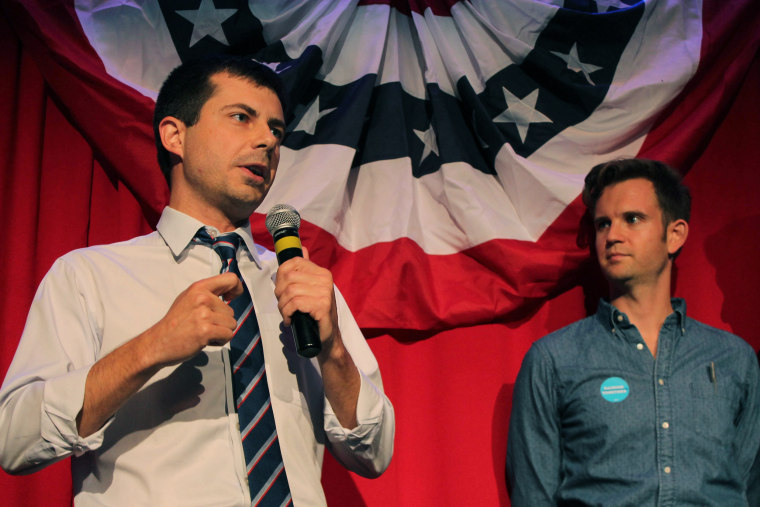Two new contenders will fill out the field of candidates vying to chair the Democratic National Committee at the party’s first official candidate forum next week in Arizona.
Pete Buttigeig, the budding mayor of South Bend, Indiana, announced his candidacy Thursday, while Idaho Democratic Party Executive Director Sally Boynton Brown entered the race just before the holidays.
Neither is well known compared to their main competition, Labor Secretary Tom Perez and Minnesota Rep. Keith Ellison. But they both argue the party needs a fresh perspective from someone outside of Washington who doesn’t carry baggage from the party’s divisive presidential primary.
Related: Ellison's DNC Chair Bid Regains Steam as New Challenger Looms
“I get that I'm not as famous, not as established as some of the other competitors,” Buttigeig said in an interview. “I don't think it’s about who's famous, I think it's about who's offering the right kind of experience to move the party forward.”
Buttigeig is an Afghanistan War veteran, Rhodes Scholar, Navy Reservist, former McKinsey consultant and Harvard graduate. He was elected mayor at 29 and reelected last year with nearly 80 percent of the vote.
Buttigeig, who spoke with all the other candidates Thursday, said he’s confident he can make inroads among the only people whose votes matter in this peculiar election: The 447 members of the DNC.
“I’ve seen a lot of people make endorsements that can't vote,” he said, referring to the members of Congress and others who don’t get to cast a ballot.
The race has so far been dominated by Ellison, who supported Sanders in the primary, and Perez, who supported Clinton, leading many to view the chair’s race as a proxy war between the two factions.
Buttigeig said that storyline is unfair to either candidate, but has nonetheless become a distraction. He is positioning himself as a third-way option.
“I know a lot of people are proud and maybe even a little defensive that we won the popular vote, and we should be,” he said. “But our party is at a nearly 90-year-low in influence. So clearly we haven't been paying the kind of attention we need to.”
Boynton Brown will also be at the candidate forum next week, likely emphasizing some of the same points as Buttigeig.
A rehash of the Democratic presidential primary is “the last thing we need,” she said in an interview.
“If Ellison came in, there would be a lot of people who feel like the party doesn't have a place for them. And conversely with Perez and Bernie supporters,” she said.
Boynton Brown, who last year was elected to be president of the Association of State Democratic Executive Directors, is positioning herself a nuts-and-bolts expert who can modernize the party to compete in places Democrats often ignore, like her native Idaho.
“We need to look at it not from a fixing the roof and the windows kind of level, but we have an opportunity to come down to the foundation level and really rebuild our party,” she said.
Boynton Brown said she never intended to get involved in politics, but she felt a religious calling to stay involved after she started working on some Democratic campaigns a few years ago. And while she is respected among party insiders, Boynton Brown is hardly a household name.
“Having high-level people doesn't seem to be working for us,” she said. “We need to have somebody who is actually amongst the people
Boynton Brown says she felt compelled to run for DNC chair in part because no other women had raised the hand for the job. “As women, I think we took the election much harder than men,” She said. “My analogy is we had our cheeks pressed up against the glass ceiling waiting for it to break and it didn't break. And that affected us on a different level.”

